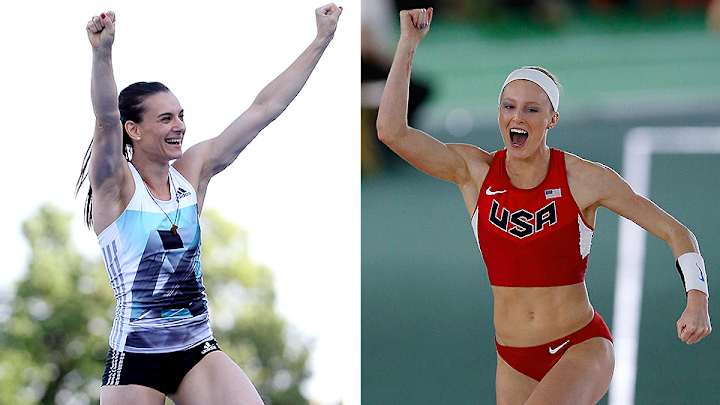With Russians out, which U.S. stars have better chances at medaling?

Your teams. Your favorite writers. Wherever you want them. Personalize SI with our new App. Install on iOS or Android.
At the 2012 Olympics, the U.S. track and field team finished atop the medal table with 28, while Russia finished second with 16 medals. But without the Russian track and field team at the Olympics, and an influx of new stars, Team USA will likely see a significant increase to their overall medal count in Rio.
The U.S. saw an overall medal boost at the world indoor championships in March with the Russians on the sidelines. However, the Kenyan and Ethiopian teams were not present in Portland, Ore. either, which likely contributed.
However, there’s some hope for Russians who can prove they’re not doping. When the IAAF made its decision to not lift the ban on the Russian track and field team before the Rio Games on June 17, the door was left open for Russians that live and train outside the country, in places with stronger anti-doping policies.
• IAAF ban of Russia’s track and field team a small win for drug-soaked sport
IOC President Thomas Bach mentioned pushing for athletes that are “probably clean” (though that assumption is tough to make with many track and field athletes nowadays). The IOC is looking to subject Russian athletes to an individual doping evaluation from an independent lab before they are allowed to compete at the Olympics. Though testing an athlete just a few weeks ahead of the Olympics only provides a small snapshot—there’s no way to prove they haven’t doped in the past.
The IAAF, at the moment, stands behind a full ban, saying it sends a stronger message.
• Wrestler Helen Maroulis’s toughest opponent is off the mat
Which U.S. athletes might have a better chance at winning an Olympic medal if their Russian competitors don’t compete? Let’s take a look at the Russian athletes most likely to medal who may be out and U.S. stars (who did not compete at the 2012 London Games) who would then have a better shot at filling their void on the podium.
OUT: Yelena Isinbayeva—2004, ’08 pole vault Olympic champion
Isinbayeva, the two-time Olympic champion, has been the most vocal Russian athlete against the ban, and she plans to appeal the suspension and possibly file a lawsuit in human rights court. Before this week’s Russian national championships, she was last seen in action in 2013. Since then, she gave birth to a daughter and then suffered injury setbacks in her comeback.
At the Russian nationals, Isinbayeva cleared 4.90-meters for new world-leading mark and her best outdoor vault since setting the world record in 2009. Watch her below:
After clearing 4.90 to win the title and earning the Olympic qualifying spot, she wanted to take a crack at the world record. She made one attempt at 5.07 meters and did not clear, but her message was loud and clear—she still has what it takes to compete against the best and wants her spot in Rio.
IN: Sandi Morris—2016 pole vault world indoor silver medalist
After winning silver at the indoor world championships, Morris has solidified her status as an Olympic medal hopeful. The former Arkansas Razorback suffered an early-season injury, but with recovery and time off before the U.S. Olympic Trials, she could peak in Rio. Her personal best of 4.83 meters would have won gold in London.
If Isinbayeva finds a way to compete, the pole vault event between Morris, Isinbayeva and 2012 Olympic champion Jenn Suhr will be a must-watch.
• Ryan Lochte: My rivalry with Michael Phelps is one of the best in sports
OUT: Sergey Shubenkov—2015 110-meter hurdle world champion
Shubenkov’s absence comes with a sad story. His mother, Natalya Shubenkova, was a Russian heptathlete who missed the 1984 Olympics in Los Angeles as the the Soviet Union and its Communist allies boycotted the Summer Games. Shubenkov won last year’s world championships in Beijing, and Rio would have been his first Olympics.
Shubenkov told reporters that he’s been facing much slower competition to start this season, resulting in slower times. On Tuesday, he captured the Russian national title in a season’s best of 13.20, which would tie him for sixth on the world list for this year.
IN: David Oliver—2013 110-meter hurdle world champion, ’08 Olympic bronze medalist
His world championship win in 2013 helped ease the pain from missing the Olympics in ’12—despite being a favorite and signing a major endorsement deal with Coca Cola for ads in London. Oliver just missed the podium at last year’s world championships with a fourth place finish, but he continues to be in good form for 2016 and has run 13.09 for the second-fastest time of the year.
He is one of the more consistent American hurdlers with a very good chance of making the team. At the moment, Jamaica’s Omar McLeod is the favorite for gold as he is the lone man under 13-seconds for year.
• Coach of top Ethiopian runner arrested for possession of EPO
OUT: Anna Chicherova—2012 high jump Olympic champion and Mariya Kuchina—’15 high jump world champion
Anna Chicherova is reportedly one of the athletes that tested positive in the re-examination of doping samples from the 2008 and ’12 Olympics. Chicherova is also the 2011 world champion and owns silver medals from ’07 and ’09 worlds to go along with the ’12 Olympic gold and ’08 Olympic bronze medals. Chicherova has not competed since late May before the doping allegations arose.
The 23-year-old Kuchina, who won last year’s world championships, is another example of a young athlete missing out on their first Olympics.
IN: Vashti Cunningham—2016 high jump world indoor gold medalist
The daughter of former NFL quarterback Randall Cunningham is already a gold medalist from the world indoor championships. She holds an outdoor personal best of 1.96-meters, which she has not matched this outdoor season but she competed sparingly to get ready for the trials. If you still haven’t read Tim Layden’s profile from earlier in the month, be sure to check it out.
OUT: Mariya Savinova—2012 800-meter Olympic gold medalist
Savinova, who has not competed since 2013, was featured discussing her doping regimen in one of the doping documentaries by German ournalist Hajo Seppelt. The World Anti-Doping Agency recommended that she, along with 2012 800-meter Olympic bronze medalist Ekaterina Poistogova, be given lifetime bans. Her performances, aided by banned substances, have kept Americans like AlysiaMontano off the podium on several occasions.
IN: Ajee Wilson—2016 800-meter world indoor silver medalist
The U.S. has not won a gold medal in any distance event of 800 meters or longer since David Wottle’s gold-medal run in 1972. A gold medal may not be in reach given how dominant Caster Semenya, a controversial runner with hypoandrogenism, has been in 2016. Wilson was the fastest 800-meter runner in 2014, and if she can regain her form in time, she can hit the podium at her first Olympics.
